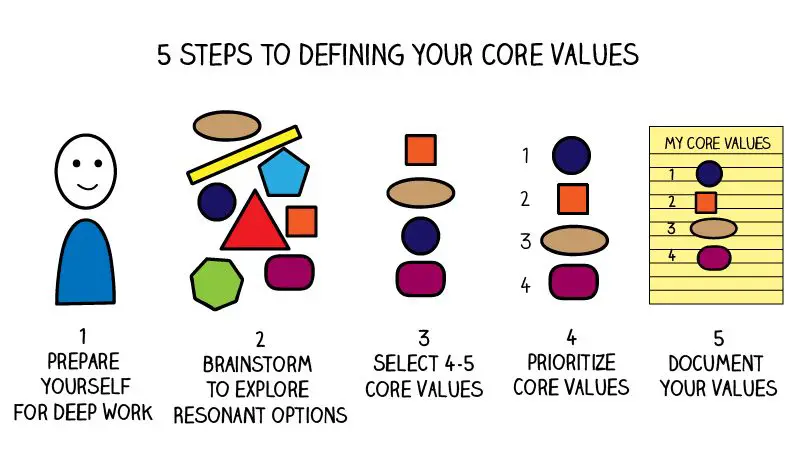What Is Your Warning Label?
We all have quirks, flaws, and triggers that can be difficult for others to understand or navigate. Getting to know ourselves on a deeper level allows us to have more self-awareness and self-compassion. It also enables us to communicate and set boundaries in a way that honors our needs while showing up as our best selves. In a sense, we all have an internal “warning label” comprised of the sensitive areas and subjects to approach with care.
Understanding your own warning label is an act of self-love, helping you understand, accept, and care for yourself as a whole person. Increased self-knowledge allows you to nurture your strengths and have self-compassion for your growing edges. It also helps you communicate in your relationships from a grounded, mindful place. When we know our own warning labels, we can give others the gift of understanding how to interact with us in ways that feel safe and supportive.
Self-Awareness
Self-awareness is the ability to accurately see your own strengths, weaknesses, values, motivations, emotions and thought patterns (Tasha Eurich, Only 15% of People are Truly Self-Aware). Research shows that even though most people believe they are self-aware, true self-awareness is rare. Only 10-15% of people are estimated to be truly self-aware (Tasha Eurich, What Self-Awareness Really Is).
Being self-aware means being able to reflect inwardly and recognize your own strengths and weaknesses. It is the ability to know yourself—your emotions, behaviors, values, blindspots—and understand how you are perceived by others. Self-awareness allows you to make choices that align with your values and motivations. It helps you identify areas for self-improvement and growth. Developing self-awareness takes continual self-reflection, soliciting feedback from others, and being open to challenges to your self-perception.
Emotional Triggers
We all have emotional triggers – situations that provoke strong emotional reactions in us. Identifying your personal emotional triggers can give you greater self-awareness and ability to manage them. According to BetterUp, common emotional triggers include:
- Stressful events – Things like accidents, trauma, abuse, or loss can be triggering (https://www.betterup.com/blog/triggers).
- Negative memories – Failures, embarrassing moments, disappointments, and other bad memories can spark an emotional reaction when recalled (https://www.healthline.com/health/mental-health/emotional-triggers).
- Anxiety triggers – Situations that provoke panic, anxiety, and stress responses tend to be emotional triggers for many people (https://ridgeviewhospital.net/how-to-identify-emotional-triggers-in-3-steps/).
Making a list of your common emotional triggers can help you anticipate and manage your reactions proactively. Pay attention to situations that consistently evoke strong emotions like anger, fear, sadness, shame, or insecurity. These are likely your triggers.
Communication Style
My communication style tends to be assertive. According to experts, assertive communication involves expressing your feelings, needs, and thoughts in an open, honest, and respectful way that does not infringe on the rights of others (https://umatter.princeton.edu/respect/tools/communication-styles). It aims to find a balance between passive and aggressive communication. With assertive communication, I speak up for myself while still considering the rights and feelings of others.
For example, if I felt upset about something a coworker did, I would directly but calmly explain how their actions impacted me, using “I feel…” statements. I would focus on resolving the issue respectfully, not attacking their character. This allows me to express myself and be heard without being pushy or passive.
Assertive communication also involves clearly stating needs and setting boundaries, while remaining flexible (https://www.snhu.edu/about-us/newsroom/liberal-arts/types-of-communication-styles). I strive to find win-win solutions through compromise and avoid aggression or passivity. Overall, this style allows me to advocate for myself while maintaining positive relationships.
Work Habits
My work habits tend to be intense and focused. Once I start working on a project, I have a hard time pulling myself away until it’s completed. This leads to long hours and a tendency to bring work home with me. According to a Gallup report, the average American works 47 hours per week, which is more than many other developed countries. While my dedication helps me achieve results, it can also lead to burnout if I’m not careful about setting boundaries and taking breaks.
I prefer to work independently, which allows me to concentrate deeply on tasks. However, this can become problematic in team settings, where collaboration is key. I’ve learned that I need to make an effort to communicate frequently with colleagues and ask for their input. Though I’m highly self-motivated, I benefit from checking in with others periodically. Research shows the typical knowledge worker spends a third of their time dealing with email. While messages are important, I have to be mindful of email overload detracting from substantive work. Overall, I strive for a balance – intense spurts of focused work balanced with collaboration, communication, and rest.
Values
Your values reflect what’s most important to you in life. They are the principles and ideals that give meaning to your life. Defining your personal values provides a moral compass to guide your goals, behaviors, and decisions.

According to research from psychologists, the most common personal values include:
- Achievement – accomplishments, results, success
- Adventure – excitement, novelty, change
- Authority – leadership, influence, control
- Autonomy – independence, freedom, choice
- Compassion – empathy, care, helping others
- Creativity – imagination, innovation, originality
Understanding your core values can help reveal priorities, motivate behavior, and outline expectations. Defining them creates self-awareness and direction throughout life’s journey.
As author Stephen Covey states, “Values govern people’s behavior, while principles ultimately determine the consequences. If your behaviors operate in conflict with your principles, you will suffer consequences.”
Thus, aligning actions with clearly defined values promotes integrity, happiness, and personal growth. Clarifying your values provides a foundation for living purposefully and intentionally.
Sources:
https://jamesclear.com/core-values
https://scottjeffrey.com/core-values-list/
Boundaries
Boundaries are an important part of self-awareness and self-care. They define the limits and rules we set for ourselves and what we will and won’t accept from others. Boundaries help us build trust and respect in relationships (The Importance of Boundaries, n.d.). Without boundaries, we risk losing our identity, overextending ourselves, and facing emotional exhaustion.
For me, key boundaries include not tolerating disrespect, passive-aggressiveness, or toxicity in my close relationships. I also set aside time for self-care and recharge my batteries alone. In terms of work boundaries, I don’t respond to messages or emails outside of business hours unless it’s an emergency. I value work-life balance. On a financial level, I always live within my means and don’t overspend.
Having these boundaries in place gives me the space I need to show up as my best self in all areas of life. They help me maintain my self-respect, say no when needed, and nurture healthy relationships. Understanding my limits allows me to thrive.
Self-Care
Self-care is vital for staying mentally and physically well. Taking care of yourself should be a priority, not a luxury. Some self-care tips to boost your mental health include getting regular exercise like walking for 30 minutes daily, which can improve mood and reduce anxiety (https://www.nimh.nih.gov/health/topics/caring-for-your-mental-health). Make sleep a priority, as adequate rest is crucial for your mood and immune system function (https://www.everydayhealth.com/wellness/top-self-care-tips-for-being-stuck-at-home-during-the-coronavirus-pandemic/). Practice mindfulness techniques like deep breathing and meditation for 5 minutes daily to relieve stress and tension (https://www.oprahdaily.com/life/health/g25939272/self-care-tips/).
Taking care of your basic needs is also essential. Eat a balanced, nutritious diet and stay hydrated. Make time for hobbies and activities you enjoy. Set boundaries with work and make time for relaxation. Surround yourself with a strong support system. Seek professional help like therapy if you are struggling with anxiety, depression, or other mental health issues. With consistent self-care, you can improve your resilience and ability to cope with life’s challenges.
Relationships
How I connect with others in relationships is one of the most important aspects of compatibility. Research shows that being comfortable being yourself and allowing emotions to surface without censorship are signs of compatibility in a relationship (https://www.paired.com/articles/what-is-compatibility-in-a-relationship). My ability to let my partner “do you” and not feel the need to be the same person also shows compatibility, as this willingness to embrace differences is key (https://psychcentral.com/relationships/what-is-relationship-compatibility). I strive for open communication, trust, and respect in my relationships. I connect best with others who allow me to be my authentic self. My compatibility with a partner stems from our ability to embrace each other’s differences while nurturing emotional intimacy.
Conclusion
In summary, self-awareness is a crucial skill for understanding ourselves and reaching our full potential. By identifying our emotional triggers, communication style, work habits, values, boundaries, and relationships, we gain knowledge that helps us be more effective and happy in life. Developing self-awareness takes continuous effort through self-reflection, feedback, mindfulness, and journaling. However, the benefits are immense. Self-aware people have higher confidence, stronger decision-making abilities, better relationships, and overall greater life satisfaction. This personal journey of discovering your own warning label is invaluable. I encourage you to keep exploring yourselves, learning, and growing every day.


